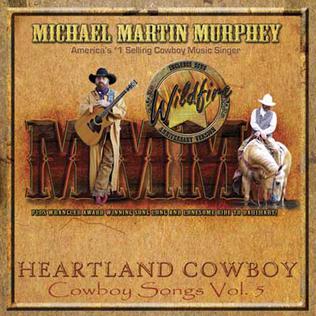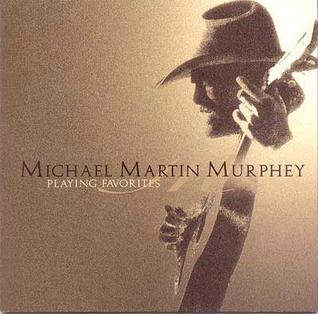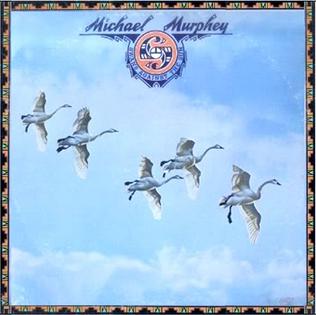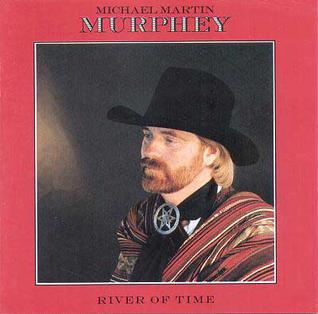
Heartland Cowboy: Cowboy Songs, Vol. 5 is the twenty-seventh album by American singer-songwriter Michael Martin Murphey, his fifth album of cowboy songs. The album includes the hit song "Long and Lonesome Ride to Dalhart", which won the 2006 Wrangler Award for Outstanding Original Western Composition. The album was inspired by Murphey's life on his ranch and his real experiences working as an activist and artist in American Ranching and Farming.

Playing Favorites is the twenty-third album by American singer-songwriter Michael Martin Murphey. Released August 21, 2001, the album features completely new recordings of eleven of the artist's country, cowboy, and popular crossover classics, as well as one new song. In his liner notes, Murphey writes that "songs are like children; they grow, evolve, change with time." The concept behind Playing Favorites was to document the growth and evolution of his best-loved tunes, using many new musicians and modern recording techniques not available when the original recordings were done.

Cosmic Cowboy Souvenir is the second album by American singer-songwriter Michael Martin Murphey. According to AllMusic, this album established Murphey as a progressive country musician. Murphey's impact on the genre was as such that one of the many names for the genre, "Cosmic Cowboy music", was taken from Murphy's "Cosmic Cowboy, Pt. 1", a song that appears on this album. The album peaked at number 196 on the Billboard 200.

Blue Sky – Night Thunder is the fourth album by American singer-songwriter Michael Murphey and is considered one of the seminal albums of his career. Released in 1975, it produced two major hit singles—the platinum-certified "Wildfire" and "Carolina in the Pines"—and established him as a major force in popular music. Members of the Nitty Gritty Dirt Band provided backing on some of the tracks.

Michael Murphey is the third album by American singer-songwriter Michael Martin Murphey and his first for Epic Records, released in 1974.

Swans Against the Sun is the fifth album by American singer-songwriter Michael Martin Murphey released in late 1975. The album features performances by John Denver, Charlie Daniels, and Willie Nelson, and peaked at number 44 on the Billboard 200.

Cowboy Songs Four is the twenty-first album by American singer-songwriter Michael Martin Murphey, his fourth album of cowboy songs, and his first album produced by his son, Ryan Murphey. The album features a guest performance by Lyle Lovett on "Farther Down the Line".

The Horse Legends is the twentieth album by American singer-songwriter Michael Martin Murphey. This is Murphey's tribute to the horse and contains a duet with Johnny Cash on "Tennessee Stud", cover versions of Dan Fogelberg's "Run for the Roses" and Gordon Lightfoot's "The Pony Man", and re-recordings of Murphey's "Wildfire" and "The Running Blood". The Horse Legends was the last album Murphey recorded for Warner Bros. Records.

Sagebrush Symphony is the nineteenth album by American singer-songwriter Michael Martin Murphey, his second live album since his 1979 live/studio album Peaks, Valleys, Honkytonks and Alleys, and his first album with a symphony orchestra. Recorded live with the San Antonio Symphony Orchestra, this ambitious album, which presents cowboy songs and poems in a symphonic setting, contains a selection of Murphey's most popular songs, as well as traditional cowboy music. Murphey turns in "an impassioned performance" and the inclusion of guest artists Sons of the San Joaquin, Ric Orozco, Herb Jeffries, and Robert Mirabal "adds to the musical diversity and richness of the album."

Cowboy Songs III – Rhymes of the Renegades is the eighteenth album by American singer-songwriter Michael Martin Murphey and his third album of cowboy songs. The album is devoted to cowboy folklore and true tales of the West and focuses on real-life outlaws, from Jesse James to Billy The Kid to Belle Starr. Murphey performs these songs "with a scholar's eye and a fan's heart."

Cowboy Christmas: Cowboy Songs II is the seventeenth album by American singer-songwriter Michael Martin Murphey, his second album of cowboy songs, and his first album of Christmas music.

Cowboy Songs is the sixteenth album by American singer-songwriter Michael Martin Murphey and his first album of cowboy songs. The album peaked at number 25 on the Billboard Top Country Albums chart.

Land of Enchantment is the fifteenth studio album by American singer-songwriter Michael Martin Murphey. The album reached number 33 on the Billboard Top Country Albums chart.

River of Time is the fourteenth studio album by American singer-songwriter Michael Martin Murphey. The album contains a newly recorded version of "What Am I Doing Hangin' 'Round?" and a duet with his son, Ryan Murphey, on "Talkin' to the Wrong Man" which reached number 4 on the Billboard Hot Country Singles chart in July 1988 and number 1 on the RPM Country Singles chart in Canada. River of Time peaked at number 11 on the Billboard Top Country Albums chart.

Americana is the thirteenth studio album by American singer-songwriter Michael Martin Murphey and his second for Warner Bros. Records. Murphey found a receptive home with the label and began a long association with the label's president and resident producer, Jim Ed Norman. Unlike his previous albums, Americana contains material written mainly by other writers—Murphey only wrote or co-wrote three of the songs. The album's notable tracks include the #1 hit "A Long Line of Love" and the #4 "Face in the Crowd", the latter a duet with singer Holly Dunn. The album peaked at number 32 on the Billboard Top Country Albums chart.

Tonight We Ride is the twelfth studio album by American singer-songwriter Michael Martin Murphey and his first for Warner Bros. Records. Released in 1986, the album was produced by Jim Ed Norman and contains guest performances by Holly Dunn, Reggie Young, Mark O'Connor, Charlie McCoy, and JD Souther. The album's title track was also its first single. The album peaked at number 46 on the Billboard Top Country Albums chart.

The Heart Never Lies is the eleventh studio album by American singer-songwriter Michael Martin Murphey. The album peaked at number 27 on the Billboard Top Country Albums chart.

Michael Martin Murphey is the tenth studio album by American singer-songwriter Michael Martin Murphey and his first for Liberty Records. The album peaked at number 14 on the Billboard Top Country Albums chart.

Lone Wolf is the seventh album by American singer-songwriter Michael Martin Murphey. The album peaked at number 99 on the Billboard 200.

Peaks, Valleys, Honky Tonks & Alleys is the eighth album by American singer-songwriter Michael Martin Murphey and his first live album. The first five tracks were recorded at the legendary Palomino Club in North Hollywood, Los Angeles, an important West Coast country music venue. The remaining five tracks are studio recordings. The live tracks showcase Murphey's early work with some interesting twists. His "Cosmic Cowboy" turns into a breakdown, while "Another Cheap Western" is coupled with The Olympics' 1958 hit, "Western Movies". The album produced the singles "Backslider's Wine" and "Chain Gang" that peaked at numbers 92 and 93 on the Billboard Hot Country Singles chart respectively.




















